"I am not sure whether I'll be a good politician. The former president [Mahindra Rajapaksa] always says that I do not understand politics… But Donald Trump has come from business. We have to see," said Gotabaya Rajapaksa while addressing a gathering of Colombo-based international journalists in 2017.
In less than three years after making this statement, on November 18, 2019 he was sworn-in as the seventh president of Sri Lanka by securing 52.25 percent of the vote, marking the return of the Rajapaksa family to power.
"The new president has decided not to move into the presidential palace… He does not believe in pomp and show. The presidential palace will only be used for official ceremonies; he's also cut down his cavalcade and extra security," Nitin Gokhale, editor-in-chief of Strategic News International (SNI) who's covered Sri Lanka for over 13 years, told CGTN Digital.
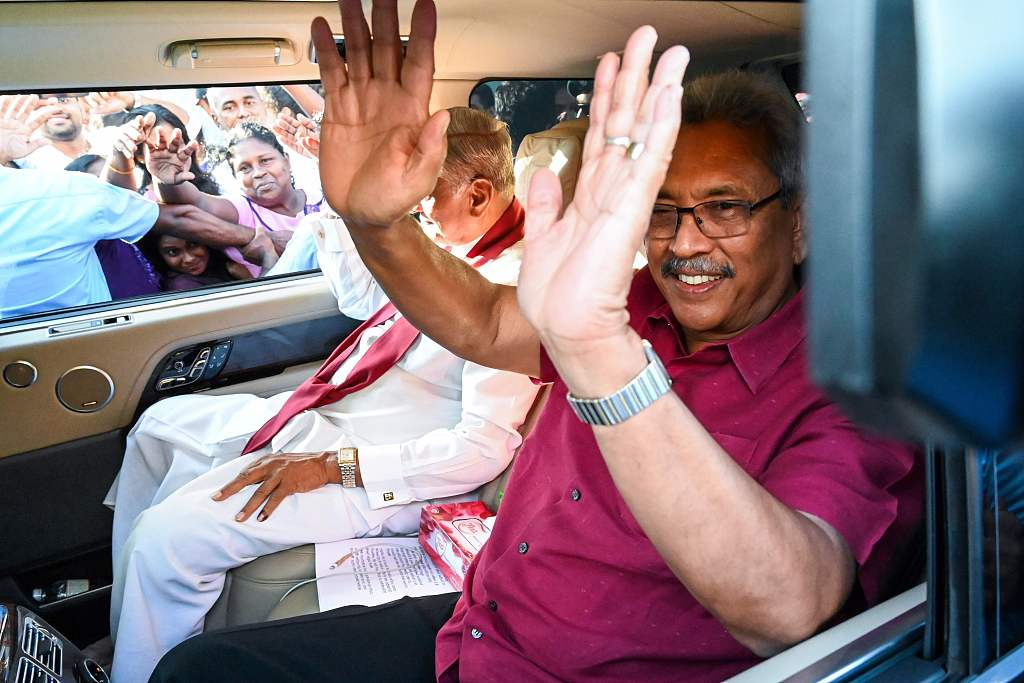
Gotabaya Rajapaksa greets supporters after winning the presidential election in Colombo, Sri Lanka, November 17, 2019. /VCG Photo
Gotabaya Rajapaksa greets supporters after winning the presidential election in Colombo, Sri Lanka, November 17, 2019. /VCG Photo
The 70-year-old retired lieutenant colonel is the fifth of nine siblings and part of one of Sri Lanka's most powerful political families. His father D A Rajapaksa was a prominent politician in the 1960s and served as an MP and a cabinet minister while his elder brother Mahindra Rajapaksa has served twice as the country's president.
As the Sri Lanka constitution allows only two terms for a president, Mahinda could not run for another term. Therefore, Gotabaya was put forward as the Sri Lanka Podujana Peramuna (SLPP) candidate, a Sinhalese-Buddhist nationalist party. And soon after winning the fiercely fought election, he appointed his elder brother Mahindra as the country's prime minister.
"The elder brother still commands respect in the masses… as somebody who will facilitate a better future – they will work together. Mahindra is a quintessential politician and will mobilize the public," Gokhale said.
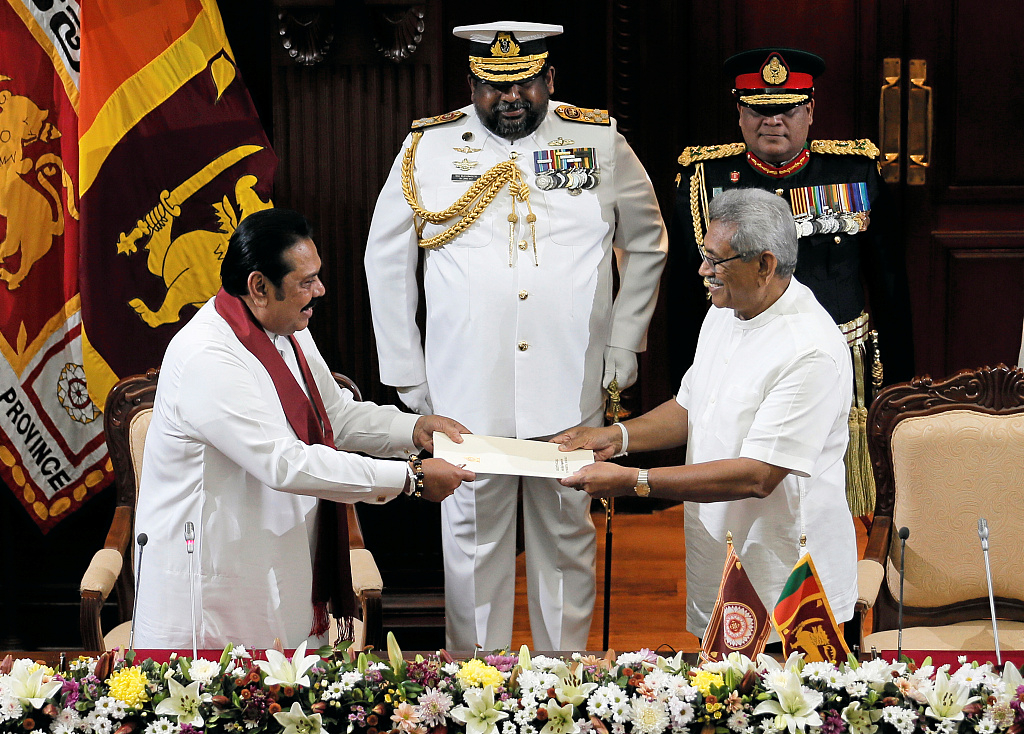
Sri Lankan President Gotabaya Rajapaksa hands over a document to his brother and former leader Mahinda Rajapaksa, who has been appointed as the new prime minister, during the swearing-in ceremony in Colombo, Sri Lanka, November 21, 2019. /VCG Photo
Sri Lankan President Gotabaya Rajapaksa hands over a document to his brother and former leader Mahinda Rajapaksa, who has been appointed as the new prime minister, during the swearing-in ceremony in Colombo, Sri Lanka, November 21, 2019. /VCG Photo
Gotabaya joined the Ceylon Army as a Cadet Officer in 1971, winning several awards for gallantry during his 20-year military career. In 1998, he left military service to work as an IT professor in the United States.
"In 2005, he came to help his brother [Mahindra] with his election campaign," Gokhale said. "After Mahindra won, it was at a family gathering when he told Gotabaya 'you are not going back'."
He was the defense secretary of Sri Lanka from 2005 to 2015 under his brother's presidency and played a crucial role in defeating the Tamil Tiger separatist rebels in 2009.
Asanga Abeyagoonasekera, director general of the Institute of National Security Think Tank Sri Lanka (INSSSL) in Colombo, told CGTN Digital that instability due to bipartisan system in the government made people vote for a stronger leader this time.
"Gotabaya's role in defeating terrorism in Sri Lanka was significant; after Easter Sunday attacks national security became one of the main agendas this election… millions of people in Sri Lanka see him as a strongman with a proven track record in managing security affairs," he said.
The April attacks on churches and hotels left more than 250 dead and hit the tourism sector, a major revenue earner in the country.
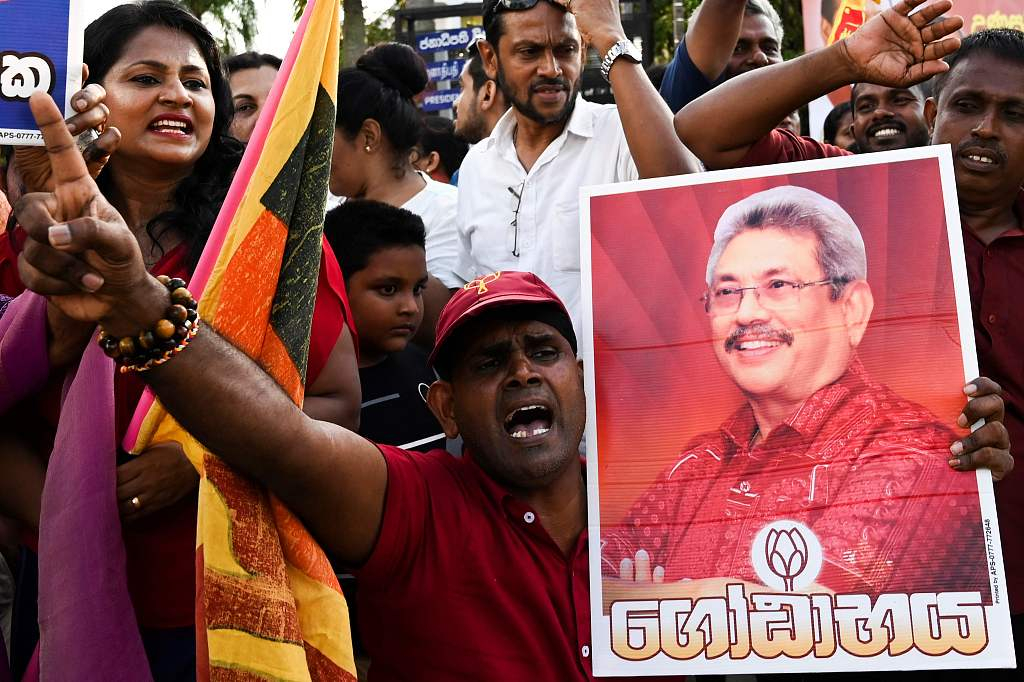
Supporters of Sri Lanka's president-elect Gotabaya Rajapaksa shout slogans as he leaves the election commission office in Colombo, November 17, 2019. /VCG Photo
Supporters of Sri Lanka's president-elect Gotabaya Rajapaksa shout slogans as he leaves the election commission office in Colombo, November 17, 2019. /VCG Photo
But there are those who have sounded fears. Sri Lanka's Sunday Observer newspaper published a front-page editorial on 10 November titled "We fear Gotabaya," which read: "The Rajapaksa standing for election this time, was the defense secretary under whose watch journalists were killed and abducted and citizens exercising their democratic right to protest were shot to death… To Gotabaya Rajapaksa's die-hard followers, none of this matters. His alleged violent rule is what makes him their champion."
However, none of these allegations have been proven. "The accusations are baseless, the previous United National Party government could not prove anything, he was never charged under the Sri Lankan law," said Abeyagoonasekera, adding, "the fear factor is because of the long war during which the entire nation suffered collectively."
Gotabaya Rajapaksa, who urged Muslims and Tamilians to be part of his success and join him in building "one Sri Lanka" during his first speech as president, is often described as "ruthless, authoritarian, and racist" by the Western media. He has also been accused by the United Nations of committing atrocities during the final stages of the war. But the military officer-turned-president says wars never go as planned.
"See, war is not a rosy thing, whether you internally fight or whether the Americans come and fight in Iraq or Afghanistan or the UK government fight in Iraq or Afghanistan. Whether it is internal or outside, war is not a rosy thing and everything doesn't go very smoothly, but we are a poor country, we are a lesser power so our things are highlighted more," Gotabaya Rajapaksa told Gokhale in his first international interview after taking over as president.
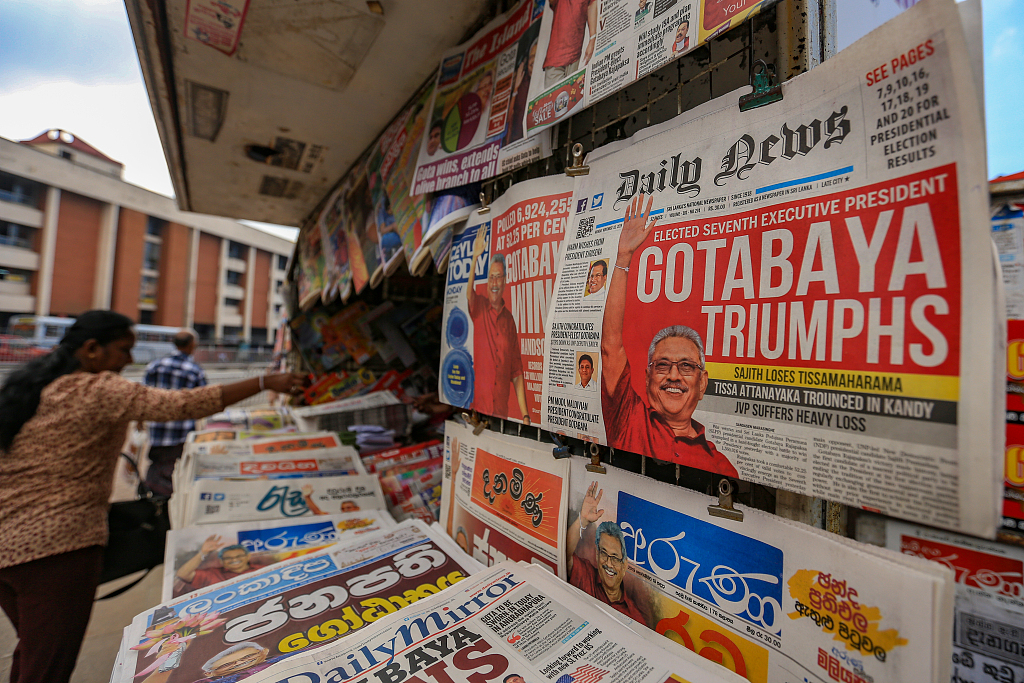
Sri Lankan newspapers' front-page headlines covering the victory of newly elected president Gotabaya Rajapaksa in Colombo, Sri Lanka, November 18, 2019. /VCG Photo
Sri Lankan newspapers' front-page headlines covering the victory of newly elected president Gotabaya Rajapaksa in Colombo, Sri Lanka, November 18, 2019. /VCG Photo
The newly elected president also claimed that he's a disciplined person and a wrong image of his personality was created during the conflict period. "I have proved in my actions that I am not racist, I don't work only for one section of the society," he said.
Gokhale, who first met Gotabaya Rajapaksa as a journalist while covering the Sri Lankan civil war over a decade ago, claimed "he's misunderstood and should not be judged just from his past."
"He's a straight talker, who does not like to beat around the bush. He has no dual approach on things, he says what he feels… he's a very straight forward person," Gokhale told CGTN Digital, adding that "there was collateral damage, LTTE used hostages as human shields… He has never acted against minorities, this misconception was created by some people in the West."
Dr. Chulanee Attanayake from the Institute of South Asian Affairs in Singapore also supports the new president. "Sri Lanka's post-war rehabilitation and reintegration process is among the most successful in the world" and the country was "not given enough time to complete the process and was it was rejected without any valid reason by the international community," she told CGTN Digital.
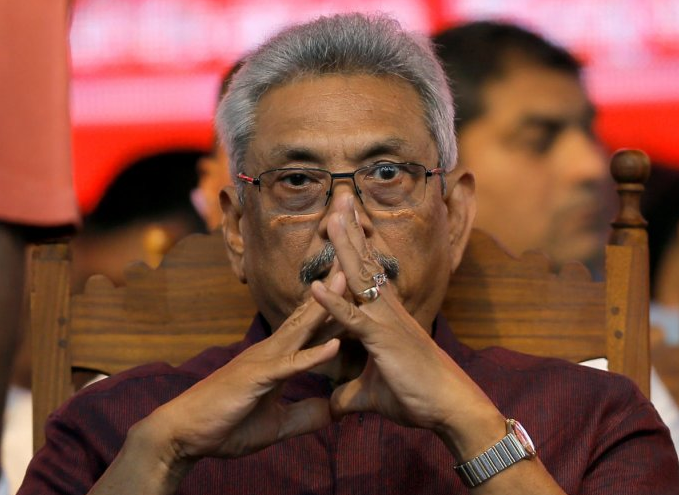
Sri Lankan President Gotabaya Rajapaksa during an election rally in Colombo. /Reuters Photo
Sri Lankan President Gotabaya Rajapaksa during an election rally in Colombo. /Reuters Photo
A 'pro-Sri Lanka' government
"Rather than putting pressure on us, understand us and get involved in the economic development of this country," said Gotabaya Rajapaksa when talking about the struggling economy he is inheriting.
During his campaign, he promised to cut the 15 percent value-added tax by nearly half and abolish some other taxes in order to boost consumption and growth.
"If you look at the economic condition today, the economic growth is at 2.7 percent – the lowest in decades… The cost of living is at its peak," said Abeyagoonasekera, adding that Rajapaksa as an efficient administrator has the ability to bring in more investments and economic development.
"He's more of tactical technocrat who has never been a full-time politician. So, he's expected to make Sri Lanka a knowledge-based and investment-friendly economy – an attractive trade destination of the 21st century," Gokhale said.
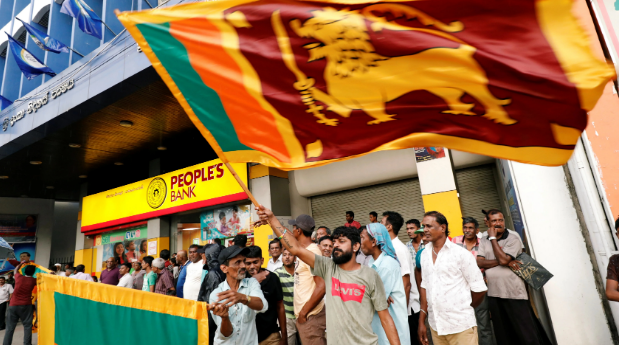
Sri Lankans rally after voting in the presidential election in Colombo, November 16, 2019. /Reuters Photo
Sri Lankans rally after voting in the presidential election in Colombo, November 16, 2019. /Reuters Photo
But the island nation also faces a mammoth 34.4 billion U.S. dollars in foreign debt, amounting to 45 percent of its gross domestic product (GDP).
"Mahindra went in for a lot of loans post 2009 since he was rebuilding the country after the decades-long civil war… and Sri Lanka did not get support from anyone other than China," said Dr. Attanayake, an expert on Sri Lanka's foreign policy, adding that "not even 10 percent of the total loan amount is owed to China."
"Sri Lanka has a debt problem, but it has nothing to do with China; the case was simply blown out of proportion because Sri Lanka is situated in an interesting position in the Indian Ocean."
As foreign policy experts remain divided over the future of Sri Lanka's relationship with China, India and the West, the country's new president has a message for them: "We don't want to get in between the power struggles of superpowers or world powers, so basically we want to work with all the countries."